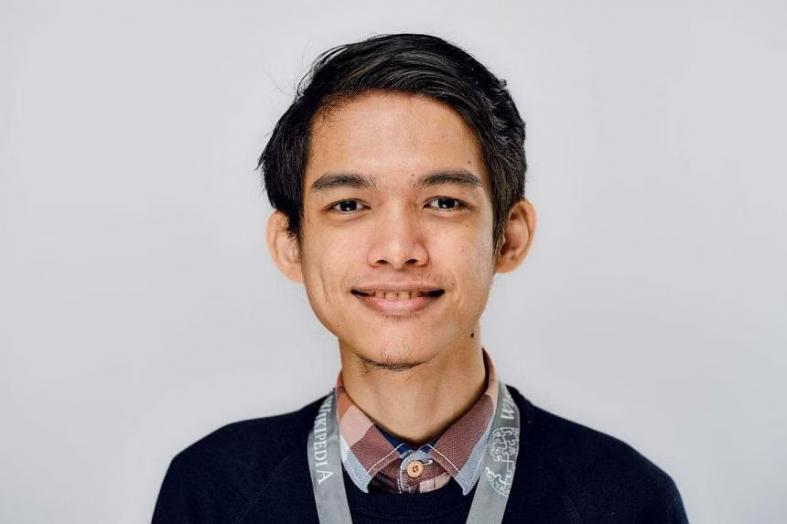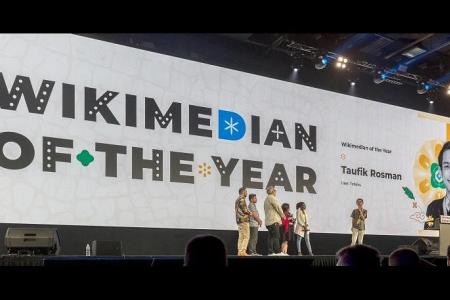Malaysia’s top Wiki editor started at age 8, has 88,000 edits to his name
It was a niggling sense of needing to right a factual error in a Wikipedia article that started Mr Taufik Rosman, at eight years old, on the path to becoming one of the most prolific editors of the free online encyclopaedia used by millions daily.
“My headmistress’ name was not updated,” he said, recalling the first Wikipedia page he tweaked, which was for his primary school, SK St Mary’s Town in Sabah. “I guess I felt the sense of responsibility to make sure this information about my school was up to date so other people can learn about it.”
That first edit has grown to around 88,000 edits he has made on sites hosted by the non-profit Wikimedia Foundation, including the multi-lingual Wikipedia and Wiktionary.
Mr Taufik, who turned 24 on Friday, was named 2023’s Wikimedian of the Year at a conference held at Suntec City in August for contributions to the Malay Wiktionary and “fostering a positive community” of Malaysian Wikimedia editors, a registered society that has grown to more than 30 active members since its 2017 inauguration.
The Sabahan with the username Tofeiku is the first person from South-east Asia to earn the main award started by Wikipedia co-founder Jimmy Wales in 2011 to honour the most impactful Wikimedia editors and contributors. He is waiting to be posted to a public secondary school where he will be teaching English.
Speaking over a video call from his home in Sandakan, Sabah, he said the award was an unexpected prize as he had never aimed for accolades while contributing as a volunteer.
“Sometimes, readers don’t see what we’ve done to help provide free knowledge,” Mr Taufik told The Straits Times. “But this (award) was recognition that the community (of contributors) in Malaysia is growing.”
“It was a bit overwhelming to be awarded the main award, and the first Malaysian to (receive it),” he said, grateful to be appreciated for his Wikimedia contributions, around 70 per cent of which he estimated to be related to Malay-language articles.
While the bulk of his contributions are Malay translations of articles from other languages, Mr Taufik also contributes to articles on news stories, such as the Kuala Lumpur LRT collision in May 2021, or historical events like the Malaysian king’s wedding in 1956.
He has also been involved in some cultural diplomacy projects, working with European embassies of countries such as Sweden and Ukraine in Malaysia to contribute Malay-language articles on Wikipedia and Wiktionary about those countries; as well as helped to conduct courses to help aspiring Wikipedia editors in countries such as Malaysia and Japan learn the ropes.
An easy task, but volunteers lacking
Editing a freely accessible online encyclopedia and dictionary can be a thankless task.
While around 46 million people use Wikipedia daily, there are only around 120,000 active editors, even though any user can conceivably edit a page.
Mr Taufik cites several examples of people around him learning to edit from scratch.

His father, a teacher, learnt to edit recently and has managed to add 200 entries to the Malay Wiktionary in about a week.
At a 24-hour “edit-a-thon” held in Kuala Lumpur earlier in 2023, around 60 Malaysian university students and rookie Wikimedia contributors produced nearly 300 articles on the topic of democracy.
“It’s not anything difficult. You just need to know the interface, which button you need to press, and then you can start editing,” Mr Taufik said, adding that he spends around 10 minutes on verifying information.
Wikipedia as a ‘synopsis’
The seemingly low barriers of entry for editors have raised doubts over the reliability and accuracy of information on these sites.
But Mr Taufik is adamant that Wikipedia users can learn to assess the reliability of information on their own, thanks to the references cited by article writers, even with topics unfamiliar to the user.
“You can check the references, and whether the information there matches those in the citations – whether it was from a journal, or gossip website or social media,” he said. “Whenever you read it, Wikipedia is just the synopsis. If you want to learn more, do so from the citation itself because it would be more lengthy, more in-depth.”
He added that there is a sufficiently robust monitoring system, where all editors have access to updates on the changes made on the encyclopaedia, and they may take up to two minutes to correct an error published online after they learn of it, especially when they appear to have been the work of anonymous editors.
Mr Taufik said seasoned editors usually monitor for “vandals”, users who may add erroneous information out of malice or as a practical joke, adding that the pages belonging to politicians tend to be prime targets for such information vandalism.
The rise of misinformation is a growing problem, however, and editors such as himself may sometimes find it hard to keep up with all the changes.
On one occasion, Wikipedia vandals wrote that present-day Malaysian politicians were the main instigators of World War II, and the falsehood was missed for a few days before it was corrected.
“Sometimes, people like to vandalise articles and post them on social media for the laughs,” said Mr Taufik, adding that there may be up to around 500 edits a day, which makes it a mean feat for the handful of volunteer monitors to stay on top of.
For a period during the pandemic, when he was a 21-year-old university student, he was editing on a more intensive basis because he spent more time at home. Once, he started his morning translating to Malay an article on tooth decay and only realised he had been working on it for more than eight hours when night fell.
Mr Taufik said he paces himself more these days, spending up to two hours a day in multiple pockets of time on the sites, averaging around 10 edits or dictionary entries a day.
When he starts work as a teacher, he said he may not be able to devote as much time as before on Wikimedia projects, but is eager for more volunteers to take over the reins.
Mr Taufik is also looking forward to passion projects, including visiting Kelantan to help preserve the Mendriq indigenous language of an orang asli community, whose native tongue could become extinct in 20 years, according to some estimates.
Referring to the Wikipedia logo of an “unfinished” globe of jigsaw pieces, he said: “We are getting there, to complete the globe... It can be knowledge in any field you have, we still need more volunteers.”
Get The New Paper on your phone with the free TNP app. Download from the Apple App Store or Google Play Store now


